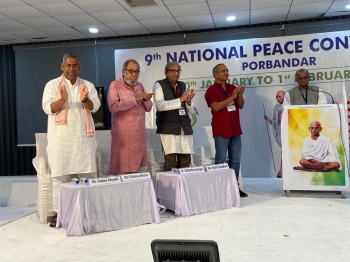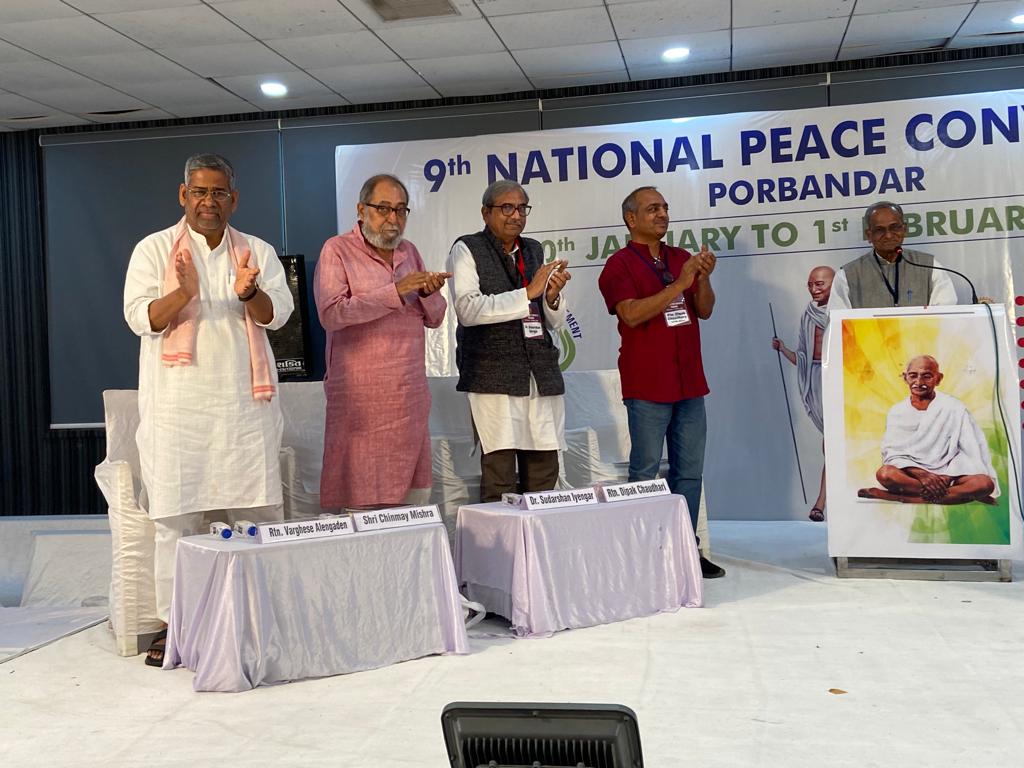
.png) Jacob Peenikaparambil
Jacob Peenikaparambil

It is a happy coincidence that the day on which Bharat Jodo Yatra led by the Congress under the leadership of Rahul Gandhi concluded at Srinagar with a clarion call for creating an India of love and harmony, 285 people from 12 states of India renewed their commitment to the way of Mahatma Gandhi -- the way of non-violence, peace and pluralism -- at his birthplace Porbandar at the starting of the 9th National Peace Convention.
Prior to the starting of the convention all participants visited the ancestral house of Mahatma Gandhi where Bapu was born, and prayed for peace while paying homages to the Father of the Nation.
As in the previous years, Gandhiji overshadowed the speeches and deliberations of 9th National Peace Convention. There was no speaker who did not refer to Mahatma Gandhi when they shared their views on peace-building. Ten speeches were fully focused on Mahatma Gandhi and his contribution to peace building. Inclusion, pluralism and non-violence were the prominent themes reverberated during the three days’ deliberations. One of the most attractive sessions was of five students who spoke about different aspects of Mahatma Gandhi’s contribution to peace.
Besides talks by individuals from different fields, the process of the Peace Convention consisted of value-based songs, dances and group discussion. One-hour Interfaith songs presented by Madusudan Babul and team on 30th January not only educated the participants but also enthralled them.
The participants of the Peace Convention consisted of professionals from various fields, Rotarians, educationists, social activists, principals, teachers and students from 12 states of India. About 40% of the participants were students and teachers. They listened to, reflected and discussed the following themes/topics during the convention.
1. Interfaith dialogue and peace building
2. Mahatma Gandhi, the harbinger of active citizenship
3. Relevance of Gandhian economy today
4. Gandhi, science and education
5. Role of non-violence in promoting peace according to Mahatma Gandhi
6. Unity in diversity, essential for world peace, according to Mahatma Gandhi
7. Gandhian concept of Antyodaya and peace-building in the context of today
8. Women and peace building from Gandhian perspective
9. Mahatma Gandhi, a role model for youth in peace-building
10. Gandhi as a leader for peace
11. Media assassination of Mahatma Gandhi
12. Peace through service
13. Peace and Ethics
14. Inclusion of the differently-abled for a peaceful society
Main Insights
1. Global peace is not possible without interfaith harmony and interfaith harmony is not possible without respecting all religions. Swami Vivekananda and Mahatma Gandhi taught us by their life and teaching the millennial heritage of India, unity in diversity and Ekakam sat vipra bahudha vadanti (“There is only one truth (or true being) and learned persons call it by many names”).
2. According to Gandhiji, active citizenship means not only following laws and rules, but also questioning unjust laws, treating rights and duties as two sides to the same coin, to be connected with each other and mother earth, to be responsible in the use of resources, to empower women and to own the country by being responsible to the inclusive development of all citizens.
3. It is a natural law that everybody sacrifices something so that others get something; all of us are interdependent. Peace requires being aware of inter-dependence and living accordingly.
4. Arms race cannot bring peace, it will only impoverish people of a country by diverting the scarce resources from meeting the basic needs of people, especially those who are at the bottom of the economic pyramid.
5. Follow the advice of Gandhiji, think about the last and the least when we take decisions in life and how our decisions are going to affect them.
6. Focus on the practice of ethics and values promoted by religions, and not on rituals, in order to prevent religion being hijacked and abused by political and religious leaders.
7. Any war is a sin against humanity and using religion for war is doubly sinful and criminal.
8. The aggressiveness and hatred that have increased in Indian society, especially during the last one decade, are diametrically opposed to Gandhian principles and way of life.
9. Do justice not only to human beings, but also to other creatures, including animals and birds.
10. For Gandhiji, truth is God and he was bold enough to make experiments in almost all aspects of life in search of truth.
11. Service to the needy involves humility, sharing from what one has and not from the abundance and respecting the dignity of all human beings.
12. Communicate, connect, and collaborate for sustainable peace through caring for the earth and sharing one’s resources with others, especially the needy.
13. Peace is not the absence of conflicts, but the ability to cope with conflicts. Let collaboration defeat competition in order to create a peaceful world.
14. Non-violence is the strongest weapon to fight the mightiest and it is intimately related to secularism or pluralism. Live and let live is the basis of non-violence.
15. We, the human beings, have no right to violate the God-given law of diversity and impose uniformity.
16. For the all-around development of the country gender equality by empowering women is essential. By excluding women from community decision-making, we are losing fifty percent of the intellectual and moral wealth of the nation.
17. Gandhiji became a leader of peace by fighting against evil without hating the doer of the evil, giving equal importance to means and the ends and above all by adopting non-violent means to fight against the mighty British empire.
18. All over the world journalists are being killed, freedom of ex
Action Plan
In the light of various talks, deliberations and discussions in different groups like Rotarians, teachers and principals, students and social workers, the participants have made the following action plans. These are the commitments that they have made to themselves.
1. One-day peace conferences will be organized in collaboration with different organizations at Porbandar, Bangalore, Varanasi, Nandurbar in Maharashtra, Trichur in Kerala, Mumbai, Nasik, Dule in Maharashtra, Rourkela, and Veraval in Gujarat.
2. Peace rally will be organized on October 2 and peace awards will be instituted by Rotary Clubs, schools and other civil society organizations.
3. In order to inculcate in students respect for other faiths, they will be taken for exposure visits to different religious places like temples, mosques, churches, gurudwaras etc.
4. In view of educating students about the Gandhian way, schools will organize quiz competitions on Mahatma Gandhi to which students from neighbouring educational institutions will be invited.
5. In order to educate students, the Gandhian way of forgiveness, movies with the theme of forgiveness will be shown to the students; slogan writing competitions will be organized and students will be encouraged to read the autobiography and other writings of Mahatma Gandhi.
6. Peace education in schools will be promoted through discussion on case studies where students will have to make a choice between violent means and non-violent means, conducting meditation and encouraging students to make love offering to support the poor and the needy.
7. In order to inculcate in students the core Indian Constitutional values, teachers will be organizing inter-religious programmes, encouraging students to speak on the core constitutional values during the school assembly, and giving appreciation cards to students who practice the constitutional values.
8. Students have taken a resolution that social media platforms will be used to send messages of love, peace and harmony. They will neither send nor forward hate messages, and social media will be used for encouraging inter-religious collaboration. Short videos on great leaders will be made and circulated. Authenticity of messages on social media will be checked by referring to authentic sources, instead of believing them blindly.
9. Inter-religious prayer will be organized in schools and other institutions on important festivals of different religions.
10. Students will conduct peace assemblies, organize peace campaigns, listen to peace songs and promote the teachings of Mahatma Gandhi.
11. Professionals like doctors, teachers and engineers will be motivated to support the poor and the needy by providing their services at a very concessional rate or free of charge.
12. NGO members among the participants will do advocacy for policy changes by the government in favour of the poor, for reducing allocation on purchase of arms and ammunitions, for stopping privatization of essential services needed for the common people.
For the 285 delegates travelling from 12 States to Porbandar, the convention was a tapasya for the sake of peace. It was a symbolic ex